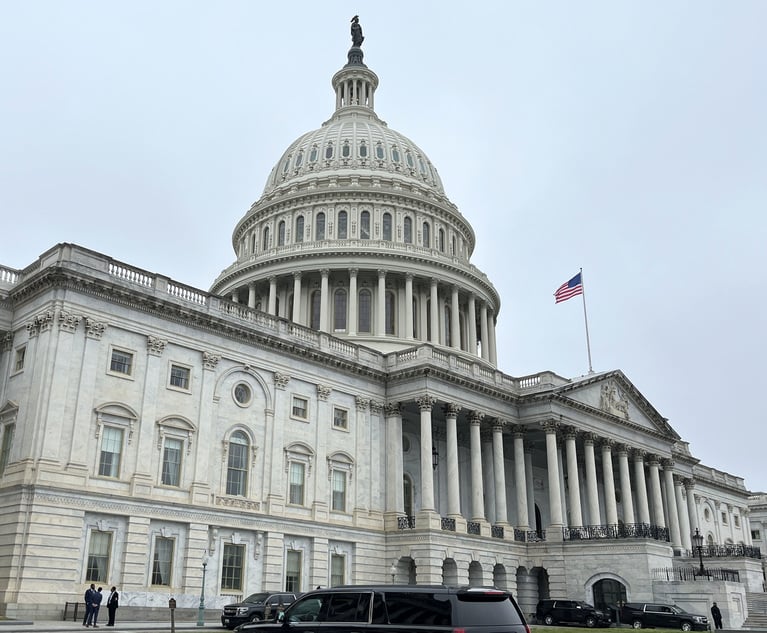California Tops the 'Judicial Hellholes' List ... Again
The report by the American Tort Reform Association ranked the top nine venues with the “most unfair” legal systems. Florida, which topped the list last year, was No. 2.
December 04, 2018 at 07:10 PM
5 minute read
The original version of this story was published on Law.com
California once again topped the annual “Judicial Hellholes” list.
The 2018-2019 “Judicial Hellholes,” published by defense bar organization the American Tort Reform Association, ranked the nation's top nine venues with the “most unfair” legal systems. California has topped the list at least three prior times, but last year's report bumped it to No. 2 in favor of Florida, whose highest court came out with a bevy of medical malpractice decisions for plaintiffs. This year, Florida ranked No. 2.
California's top ranking comes after the state's highest court became the first in the nation to hold manufacturers of brand-name pharmaceuticals liable in cases involving their generic equivalents.
“That was such an outlier,” said Sherman “Tiger” Joyce, ATRA's president. “There was a sense that what was going on in California collectively was enough to rule it beyond Florida, and there was not the level of negative activity in Florida.”
New York City's courts jumped to No. 3, while the Philadelphia Court of Common Pleas and New Jersey's legislature, though not its courts, also made the list.
Some overriding concerns in the report involved: the prevalence of “junk science” at trials; class actions, particularly involving food packaging, which the defense bar insists have no injuries; and “activist” attorneys general who have brought cases over opioids and climate change.
Peter Knudsen, a spokesman for the American Association for Justice, the nation's largest plaintiffs bar, said of the report: “ATRA's definition of a 'hellhole' is a courtroom where a plaintiff brings a case in front of a jury to hold an unscrupulous corporation accountable. The real hellhole is a world in which an unsuspecting consumer is harmed, abused or defrauded by an unscrupulous corporation but has no recourse and no chance to prevent future wrongdoing.”
California has been No. 1 in prior years, often cited for its unique laws, like this year's data privacy statute. But the California Supreme Court's Dec. 21 decision last year in T.H. v. Novartis Pharmaceuticals propelled it to the top of the list again. The ruling was the first to impose liability on brand-name drugmakers for the actions of generic pharmaceutical manufacturers, which the U.S. Supreme Court found in 2011 were protected from tort actions by federal pre-emption under Pliva v. Mensing.
At least 35 other state and federal courts have rejected the theory, the report says, but since the California ruling, the Massachusetts Supreme Court has adopted innovatory liability.
“The reason the decision matters is for the first time consumers of generic drugs have a remedy when they're injured by a mislabeled drug,” said Leslie Brueckner, senior attorney at Public Justice who represented the plaintiff. “That's what this decision did. And because 90 percent of the drugs in America that are consumed are generic, it's a huge deal in holding the pharmaceutical industry liable for dangerously labeled drugs.”
J.G. Preston, a spokesman for the Consumer Attorneys of California, called ATRA's list the group's “annual attempt to generate irresponsible news coverage in a callous attempt to undercut the legal rights of American consumers so that big businesses and corporate CEOs can further fatten their wallets.”
“If our state is No. 1 on the list, the reality is that we're there because California takes seriously the idea of holding wrongdoers accountable when they cheat, injure or otherwise harm consumers,” Preston said.
Preston added that it was “ironic” that would criticize the California Consumer Privacy Act in the wake of another massive corporate data breach, this time affecting customers of Marriott hotels. Last year, he said, hackers had attacked about 1,300 companies and stole more than 174 million consumer records.
“The bottom line is that American corporations have too often proven careless with consumer data, let alone their privacy,” Preston said. “Without the civil justice system to hold corporations accountable after they fail to take necessary data precautions, when will they get serious about protecting consumers?”
Here are a few more highlights from “Judicial Hellholes” report:
- The Twin Cities area of Minnesota joined the list for the first time, at No. 9, because of an $850 million settlement in a groundwater contamination case. The settlement, between Minnesota Attorney General Lori Swanson and against 3M, gave $125 million in contingency fees to outside law firms. The Minnesota Supreme Court also rejected the Daubert standard.
- St. Louis continued to be on the list, at No. 4, down one ranking from last year, due to the legislature's failure to enact tort reform. The report also noted a $4.7 billion verdict against Johnson & Johnson over its baby powder.
- The report put the Georgia Supreme Court on the “watch list” after it upheld a $40 million verdict in Chrysler Group LLC v. Walden this year.
- The Delaware Supreme Court got a “dishonorable mention” for its “take-home” asbestos ruling, and Texas trial courts for their large verdicts, such as a $706.2 million trade secret verdict against a Quicken Loans affiliate.
- The report gave kudos—called “Points of Light”—to the U.S. Supreme Court for its decision this year upholding class action waivers in employment contracts, and to the U.S. Court of Appeals for the Fifth Circuit for its reversal of a $502 million verdict over hip implants.
This content has been archived. It is available through our partners, LexisNexis® and Bloomberg Law.
To view this content, please continue to their sites.
Not a Lexis Subscriber?
Subscribe Now
Not a Bloomberg Law Subscriber?
Subscribe Now
NOT FOR REPRINT
© 2024 ALM Global, LLC, All Rights Reserved. Request academic re-use from www.copyright.com. All other uses, submit a request to [email protected]. For more information visit Asset & Logo Licensing.
You Might Like
View All
'That's Disappointing': Only 11% of MDL Appointments Went to Attorneys of Color in 2023
7 minute read
Confusion Over New SEC Cyber Rules Leading Firms to Overstate Attack Readiness

'Issues That Have to Be Addressed': New Study Finds Flaws in Reporting Federal Judicial Sexual Misconduct
6 minute read
Trending Stories
- 1Recent Decisions Regarding the Telephone Consumer Protection Act
- 2The Tech Built by Law Firms in 2024
- 3Distressed M&A: Mass Torts, Bankruptcy and Furthering the Search for Consensus: Another Purdue Decision
- 4For Safer Traffic Stops, Replace Paper Documents With ‘Contactless’ Tech
- 5As Second Trump Administration Approaches, Businesses Brace for Sweeping Changes to Immigration Policy
Who Got The Work
Michael G. Bongiorno, Andrew Scott Dulberg and Elizabeth E. Driscoll from Wilmer Cutler Pickering Hale and Dorr have stepped in to represent Symbotic Inc., an A.I.-enabled technology platform that focuses on increasing supply chain efficiency, and other defendants in a pending shareholder derivative lawsuit. The case, filed Oct. 2 in Massachusetts District Court by the Brown Law Firm on behalf of Stephen Austen, accuses certain officers and directors of misleading investors in regard to Symbotic's potential for margin growth by failing to disclose that the company was not equipped to timely deploy its systems or manage expenses through project delays. The case, assigned to U.S. District Judge Nathaniel M. Gorton, is 1:24-cv-12522, Austen v. Cohen et al.
Who Got The Work
Edmund Polubinski and Marie Killmond of Davis Polk & Wardwell have entered appearances for data platform software development company MongoDB and other defendants in a pending shareholder derivative lawsuit. The action, filed Oct. 7 in New York Southern District Court by the Brown Law Firm, accuses the company's directors and/or officers of falsely expressing confidence in the company’s restructuring of its sales incentive plan and downplaying the severity of decreases in its upfront commitments. The case is 1:24-cv-07594, Roy v. Ittycheria et al.
Who Got The Work
Amy O. Bruchs and Kurt F. Ellison of Michael Best & Friedrich have entered appearances for Epic Systems Corp. in a pending employment discrimination lawsuit. The suit was filed Sept. 7 in Wisconsin Western District Court by Levine Eisberner LLC and Siri & Glimstad on behalf of a project manager who claims that he was wrongfully terminated after applying for a religious exemption to the defendant's COVID-19 vaccine mandate. The case, assigned to U.S. Magistrate Judge Anita Marie Boor, is 3:24-cv-00630, Secker, Nathan v. Epic Systems Corporation.
Who Got The Work
David X. Sullivan, Thomas J. Finn and Gregory A. Hall from McCarter & English have entered appearances for Sunrun Installation Services in a pending civil rights lawsuit. The complaint was filed Sept. 4 in Connecticut District Court by attorney Robert M. Berke on behalf of former employee George Edward Steins, who was arrested and charged with employing an unregistered home improvement salesperson. The complaint alleges that had Sunrun informed the Connecticut Department of Consumer Protection that the plaintiff's employment had ended in 2017 and that he no longer held Sunrun's home improvement contractor license, he would not have been hit with charges, which were dismissed in May 2024. The case, assigned to U.S. District Judge Jeffrey A. Meyer, is 3:24-cv-01423, Steins v. Sunrun, Inc. et al.
Who Got The Work
Greenberg Traurig shareholder Joshua L. Raskin has entered an appearance for boohoo.com UK Ltd. in a pending patent infringement lawsuit. The suit, filed Sept. 3 in Texas Eastern District Court by Rozier Hardt McDonough on behalf of Alto Dynamics, asserts five patents related to an online shopping platform. The case, assigned to U.S. District Judge Rodney Gilstrap, is 2:24-cv-00719, Alto Dynamics, LLC v. boohoo.com UK Limited.
Featured Firms
Law Offices of Gary Martin Hays & Associates, P.C.
(470) 294-1674
Law Offices of Mark E. Salomone
(857) 444-6468
Smith & Hassler
(713) 739-1250








